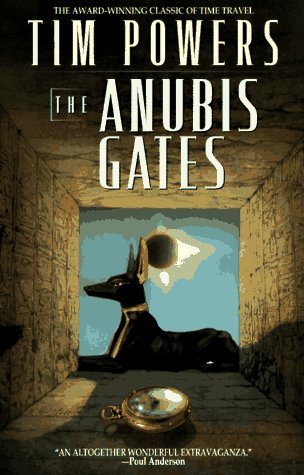Tim Powers is a remarkably clever writer, and there’s nobody else quite like him. He has a technique he has used in a number of his books, notably Declare and The Anubis Gates, where he takes a set of unusual events and makes up the rest of the story around them that would make them fit together and make sense. It’s like an inside-out conspiracy theory, or an answer to a riddle nobody was asking. In our family when we hear a particularly odd fact, we ask rhetorically “I wonder if Tim Powers knows that?” (Lord Halifax only had one hand! The glasses that Ernest Walton was wearing when he saw the atom split are stored in the same room as the Book of Kells! Every son of a British monarch called Arthur has died before reaching the throne!)
In The Anubis Gates Powers takes a lot of things that are historical facts from 1810, or at least genuine reports, and shakes them together with some of the superstitions of the period and comes up with a book as cleverly fitted together as one of those three-dimensional wooden egg jigsaws. It’s a very clever trick. I find that sometimes his books work for me and sometimes they whizz past my ear with a whistling sound. The Anubis Gates is the one I read first, and it remains the one that always works, the one I keep coming back to and always enjoy reading.
Brendan Doyle is not so much a point-of-view character as our way through the maze of intricate plot. He’s an American expert on Coleridge who’s writing a book on the obscure poet William Ashbless. He’s hired by a weird millionaire who wants a Coleridge expert to take a group of people through a gap in time in 1983 to one in 1810 to hear Coleridge lecture on Milton’s Areopagitica. He goes through to 1810, gets stuck there, and then things get very very weird. As well as the gaps in time, there’s Dog-Faced Joe, a body-switching werewolf. There are spoonsize boys who sail around in eggshell boats. There are beggar armies, a girl disguised as a boy to avenge her fiancé, a creepy clown on stilts, evil Egyptians manipulating gypsies, a ka of Lord Byron, gods, magic, time travellers, and the mystery of William Ashbless. The wonder of it is that it all makes perfect sense and comes together as neatly and satisfyingly as one of Bach’s orchestral suites.
There’s far more here than any one point-of-view could encompass, and indeed Powers gives us plenty of other points of view, but Doyle is our reliable lodestar. I find myself pulled through the intricacies on the thread of caring what happens to Doyle. I think this is why The Anubis Gates works better for me than Last Call and The Stress of Her Regard. It’s not enough to be dazzling, I also have to care, and here I do. Even knowing exactly what’s going to happen, I get caught up in the story.
There are a number of notably nifty things about this book. It’s probably worth saying that it’s a story I enjoy more re-reading and knowing what’s going on than I did the first time I read it.There are twists and revelations and things you’d never think of but that fit with machined precision—and I still like it a lot better knowing how it’s all going to come out, and that it’s all going to come out like an exceptionally satisfying sudoku. One of the things I like most about it is the way Doyle repeatedly relaxes into thinking he knows what’s going to happen, and how it does happen but never quite the way he imagines. You can’t change time in this universe, though you may hop about in it, and trying to change it defeats your purpose. But you can’t rely on what you think you know either.
He was passing a narrow street of Aldgate and somebody crossing one of the rooftop bridges was whistling. Doyle slowed to listen. It was a familiar tune, and so melancholy and nostalgic that it almost seemed chosen as a fitting accomplishment for his lonely evening walk.What the hell is the name of that, he wondered absently as he walked on. Not Greensleeves, not Londonderry Air…
He froze and his eyes widened in shock. It was Yesterday, the Beatles song by John Lennon and Paul McCartney.
For a moment he just stood there stunned, like Robinson Crusoe staring at the footprint in the sand.
Then he was running back. “Hey!” he yelled when he was below the little bridge, though there was nobody on it now.”Hey, come back! I’m from the Twentieth Century too!”
Wonderful book. There really isn’t anything else like it.










